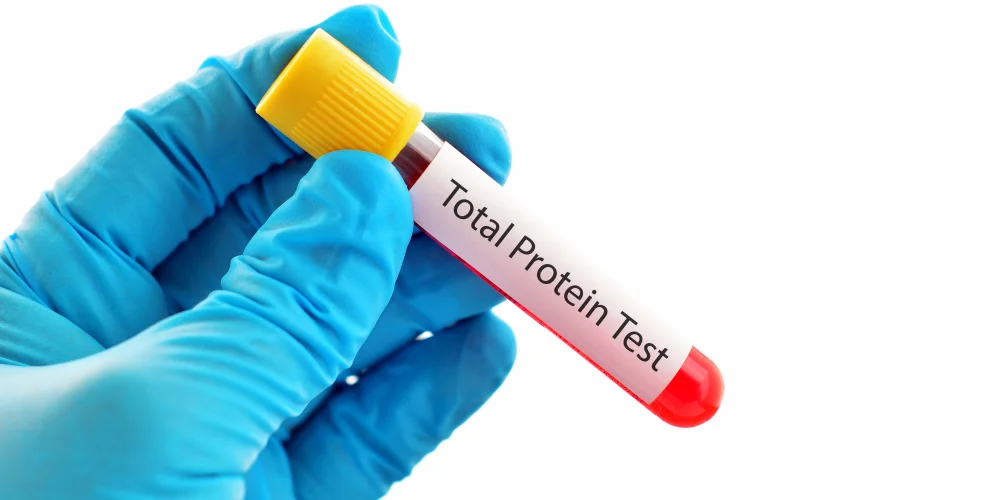Total Protein / Albumin Test
Assessing Total Protein and Albumin Levels
It is the Total Protein / Albumin test is a tool for diagnosing to determine the amount of total protein as well as albumin in blood. Proteins are essential for many bodily functions like the maintenance of fluid balance in the body, transporting chemical substances, and assisting in the maintenance of immune function. Examining their levels could give insight into general health, and aid in diagnosing conditions which affect the kidneys, liver and nutrition.

When is the Total Protein / Albumin Test Prescribed?
It is the Total Protein / Albumin test is used in a variety of circumstances in the clinical. First, it’s utilized for monitoring the liver’s function for assessing the function and health of the liver. As conditions in the liver can impact the process of synthesising proteins, which includes albumin. Furthermore, it assists to assess kidney function by testing the level of albumin in urine. This test is essential since kidney disorders could affect the absorption of proteins. In addition, it plays an important function in the evaluation of nutritional status especially in the case of protein deficiency or malnutrition and by measuring total protein levels. In addition, the test can be useful for monitoring chronic illnesses like diabetes or inflammation diseases. It provides insight on the levels of protein over time as well as aiding with disease control.
Preparation for the Total Protein / Albumin Test
There is no special preparation needed. Patients are able to eat and drink normal before taking the test, unless otherwise instructed by their doctor. It’s important to inform the doctor about any medication and supplements or any recent health issues that could influence the results of the test.
Parameters Considered During Total Protein / Albumin Test
The test is based on two main parameters The first is Total Protein is a measure of the total amount of protein that is present in blood. This includes various kinds of proteins. The other is Albumin which specifically measures the amount of albumin. Albumin is an important protein which helps maintain the pressure of oncotic and transports medications and hormones through the blood. These tests provide crucial insight into the level of protein and assist healthcare professionals in identifying and managing numerous ailments related to metabolic processes and overall health.
Time Required for Total Protein / Albumin Test Report
It is believed that the Total Protein / Albumin test generally provides results within a day. The speed of turnaround allows an immediate assessment as well as the most appropriate medical advice.
Total Protein / Albumin Test Price
In Chirayu SuperSpeciality Hospital, the total protein test cost 250 rupees. Which is a reasonable price which allows easy access to important data for diagnosis.
Book an Appointment for Total Protein / Albumin Test
Making an appointment for your Total Protein / Albumin test is easy and quick at Chirayu SuperSpeciality Hospital. You can schedule your test on our site or reach out to our staff for assistance. Our team at the pathology lab in Bhayandar is dedicated to ensuring a smooth and efficient process for all our patients.
What Our Patients Say
Hear from our valued patients about their experiences at Chirayu Super Speciality Hospital and how our care has made a positive impact on their health and well-being.


Helped detect my nutritional deficiency. Efficient and affordable testing.


Quick and painless process. Provided insights into my overall health. Thank you, Chirayu!


Accurate diagnosis, prompt results. Helpful in managing my diabetes. Grateful for the service.


Essential for monitoring my chronic condition. Professional and caring service.


Found the test very informative. Great support in managing my nutritional needs.


Efficient service, friendly staff. Vital for managing my kidney health. Thank you, Chirayu!
Frequently Asked Questions
Here, we provide answers to some of the most commonly asked questions to help you better understand our services, policies, and facilities. If you have any additional questions, please do not hesitate to contact us.
A low albumin level may suggest liver disease, kidney disease, malnutrition, or chronic inflammatory conditions.
Yes, certain medications and supplements can influence total protein levels. It’s important to inform your healthcare provider about all medications you are taking.
No, fasting is generally not required for this test unless specified by your healthcare provider.
The frequency of testing depends on your health condition. Your healthcare provider will recommend the appropriate schedule for monitoring.
Abnormal levels may indicate underlying health issues. Further evaluation and treatment may be needed based on your test results.